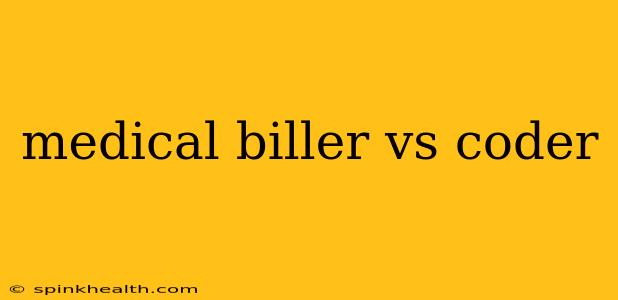Medical Biller vs. Coder: Unveiling the Differences in These Crucial Healthcare Roles
The healthcare industry hums with activity, and behind the scenes, two vital roles ensure smooth operations: medical billing and medical coding. While both are essential for efficient healthcare finance, they are distinct professions with unique responsibilities and skill sets. Let's delve into the world of medical billing versus medical coding, exploring their differences and similarities.
Imagine a bustling hospital, filled with the sounds of beeping machines and hurried footsteps. Every patient visit, every procedure, every medication dispensed generates a trail of paperwork. This is where medical coders and billers step in, playing crucial roles in ensuring healthcare providers receive the reimbursements they need to continue providing care.
What Does a Medical Coder Do?
Medical coders are the meticulous translators of healthcare. They take complex medical information—doctor's notes, lab results, diagnostic images—and convert them into standardized codes. These codes, based on systems like the International Classification of Diseases (ICD) and Current Procedural Terminology (CPT), are the language of healthcare insurance claims. They’re the key that unlocks reimbursement.
Think of it like this: a doctor describes a patient's condition and the procedures performed in detail. The coder then takes that narrative and transforms it into a concise, numerical code that insurance companies understand. Accuracy is paramount here; a single incorrect code can lead to denied claims and financial losses for the provider. This requires an in-depth understanding of medical terminology, anatomy, physiology, and the various coding systems.
What Does a Medical Biller Do?
While coders translate medical information into codes, medical billers take those codes and create the actual invoices sent to insurance companies and patients. They are the financial navigators, ensuring accurate and timely payment for services rendered. This involves a deep understanding of insurance policies, payer regulations, and billing procedures.
A medical biller’s day might involve submitting claims, following up on outstanding balances, processing payments, managing patient accounts, and handling denials. They act as the liaison between the healthcare provider and the payer, resolving discrepancies and ensuring that the provider gets paid for the services they've provided. They’re the financial gatekeepers, making sure the healthcare system keeps running smoothly.
What are the Key Differences Between Medical Billing and Medical Coding?
The core difference lies in their focus: coders translate medical information into codes, while billers use those codes to create and manage invoices. One focuses on the clinical side, the other on the financial. Here’s a table summarizing the key distinctions:
| Feature | Medical Coder | Medical Biller |
|---|---|---|
| Primary Role | Translates medical records into codes | Creates and manages patient invoices & claims |
| Focus | Clinical information & coding systems | Financial transactions & insurance regulations |
| Skills | Medical terminology, anatomy, physiology, coding systems | Insurance knowledge, billing software, accounts receivable |
| Tools | Electronic Health Records (EHR), coding software | Billing software, claims processing systems |
What Education and Training Do Each Require?
Both roles typically require some form of formal training, although the specific requirements can vary. Many coders and billers pursue certifications to demonstrate their expertise and improve their job prospects. Community colleges, vocational schools, and online programs offer various certifications and associate degrees.
How Much Do Medical Coders and Billers Make?
Salaries for medical coders and billers can vary depending on location, experience, and certification. Generally, both roles offer competitive salaries and opportunities for advancement.
Can I do both Medical Billing and Coding?
Absolutely! Many professionals work in roles that combine aspects of both medical coding and billing. This often provides a more comprehensive understanding of the revenue cycle and increased job security.
Which Career Path is Right for Me?
The best career path depends on your individual skills and interests. If you have a strong interest in medicine and attention to detail, medical coding might be a good fit. If you enjoy working with numbers and navigating financial systems, medical billing could be the better option. Both are rewarding careers contributing to the smooth functioning of the healthcare system.
This exploration hopefully clarifies the crucial distinctions between medical billing and coding. Both roles are vital cogs in the healthcare machine, working together to ensure that providers are compensated for the services they provide.

